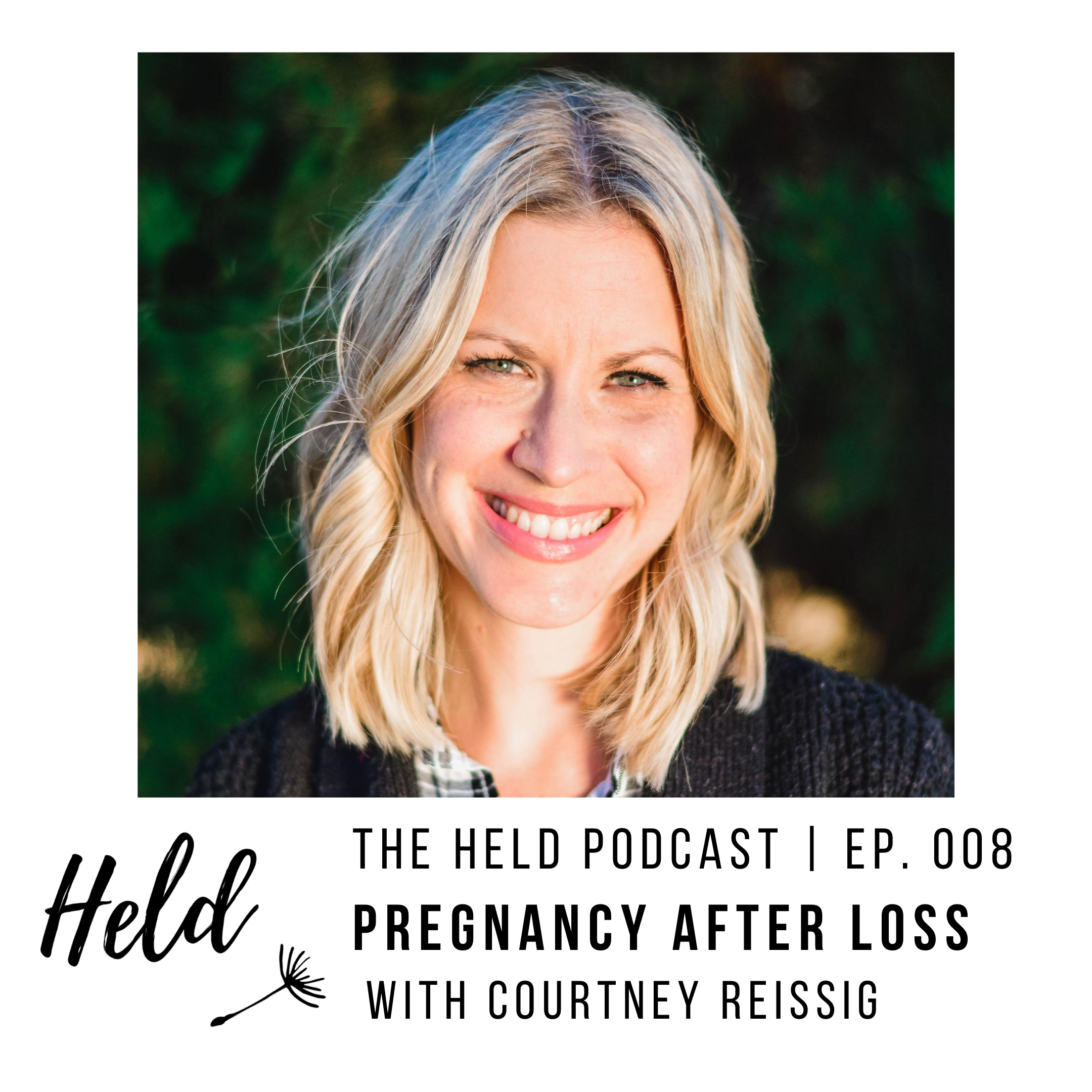Ep. 008 | Pregnancy After Loss with Courtney Reissig
In this episode of the Held Podcast, I chatted with Courtney Reissig about pregnancy after loss. We talked about common struggles and temptations that women face in pregnancy after loss including fear, anxiety, cynicism, blind optimism, triggered grief, and feeling guilt over not enjoying the very thing they’ve hoped for. I hope it this episode will encourage you to run to the Lord with whatever you may be feeling or facing, and find that he is compassionate and trustworthy.
About Courtney Reissig:
Courtney Reissig is a writer and bible teacher living in Little Rock, Arkansas. She is the proud mom of four sons, happy wife to Daniel, and author of three books: The Accidental Feminist, Glory in the Ordinary, and Teach Me to Feel: Worshiping Through the Psalms in Every Season of Life (releasing January 1, 2020). They are members of Immanuel Baptist Church. You can follow her on Twitter or Instagram (@courtneyreissig).
Questions in this Episode:
Would you start off by just telling us a bit about your own experience with miscarriage?
How did your experience of loss impact your own subsequent pregnancies? Positively and/ or negatively?
Let’s walk through some of the common struggles or temptations that face a woman in pregnancy after loss. And talk about how the good news of the gospel and God’s word offer help in that place.
a. fear
b. anxiety
c. cynicism
d. blind optimism (not thinking about negative outcomes)
e. triggered grief
f. guilt over grumbling
Practically speaking, what are some things we can do to fight this temptation/ remember the truth in those overwhelming moments?
Questions for every guest:
What’s one way God has used your experience of miscarriage to work in your heart and life?
If you could encourage a woman to meditate on or memorize any verse or short set of verses in this season, what would it be and why?
Noteworthy Quotes:
“I always describe [pregnancy] as, if you’re standing at the top of a black diamond mountain (and I hate black diamonds, I refuse to go down them), and you have no other way down. You’re up there and you’ve gotta go down, like you have to do it, and you could get really hurt along the way, but the only way out of this is down. And I feel like pregnancy, for me, was like that. I’m pregnant, and I have to deliver this baby, but it could go really badly and I could get really hurt along the way.”
“One of the things that I think the Lord did in my life with having hard pregnancies… What the Lord did in all of those was kind of rescue me from thinking I had any semblance of control over anything. I don’t think I would have said, “Oh, i think if I do xy and z it’s all going to work out fine.” I wouldn’t have told you that, but I know in hindsight 10 years later that that was kind of where my heart was.”
“It was a real test for me to have open hands before the Lord and say, “I have no control over this. I can’t keep a baby alive inside me. It sounds negative, but it's a positive!”
“I struggled to find joy in being pregnant. Instead of giving it to the Lord I would often just spin my wheels, look at message boards, look at articles, try to have some semblance of things are going to be okay… and the anxiety was just really hard for me at times.”
“Another negative that it was hard for me to process was that I would feel guilty over the fact that I didn’t like being pregnant.”
“All of the difficulty we face in pregnancy is not how God intended pregnancy to be. So, it’s all part of living in a broken world. And so in the same way that we grieve over the difficulties that this world brings us, throwing up in pregnancy is not how God intended pregnancy to be. [It’s not a good thing.] And not being able to enjoy food, and being so fatigued that you can’t take care of anything else. I think often-times we idealize and idolize what it means to be pregnant,..but feeling difficulty in pregnancy is just part of living in a broken world. And there’s a place for grieving that and lamenting that and saying “I don’t like this anymore than I like working outside in the heat without cold water. It doesn’t mean you resent your baby, it just means you don’t really like the process of getting your baby into the world.”
“[We] as modern people may look at [the Psalms] and say “that sounds like grumbling to me,” but it’s also in scripture so…, that’s the main distinction: are we taking our complaints and our hearts before the Lord primarily or are we airing our grievances all across the internet.”
“The verse that was always at the forefront of my mind was in Psalm 20 and it says “Some trust in chariots, some trust in horses, but we trust in the name of the Lord our God.” And we don’t have chariots or horses to trust in today but we do have ultrasound machines and rising HCG levels and feeling the baby kick, [and sickness], and I was struck by that verse in my second pregnancy after loss that I was putting a whole lot of hope in that ultrasound showing a beating heart. And if I had that outcome, that that would remove my fear, and if I could just carry that with me to the next appointment then I could feel okay and I was just convicted and also reminded that the ultrasound’s only telling me what’s already there, it’s not making my baby live. Only God can make my baby live.”
“What I’ve been really convicted by lately is that when I struggle with anxiety, I have found in my own life that I don’t obey Philippians 4. I just am anxious about all things. Instead of [taking] that to the Lord, I don’t take that step. He’s the only one that can sustain me and sustain the life of my unborn child.”
“[Ask] what am I trusting in that’s actually making my fear worse because it’s actually something that can’t save? And then where am I taking my fears and anxiety? Am I spinning my wheels or am I taking them to the Lord?”
“Part of living in a broken world is that we’re vulnerable. If we love deeply we’re vulnerable to pain and loss.”
“I didn’t handle cynicism well, but what helped me was that I had other people who hoped for me.”
“We could at any given point be facing the reality of any impact of the fall. We have to be mindful of that because I think if we [aren’t] then we root ourselves far too much in this world and this is not all we have.”
“The heart behind that [mentality of] “I just believe this is my rainbow baby,” the heart behind that is they want to believe God is good, they want to believe God loves them, they want to believe God is for them, and the only way that they can grasp and hold on to that is to believe that he’s not going to let anything happen to them again. Because how could he? And I get that. It would feel cruel if your rainbow baby then becomes another miscarriage, it would feel incredibly cruel, and that’s hard to work through. But it doesn’t prepare you for those realities if you only think in terms of “God would never let that happen to me again.” We just have to live in that tension of “I’m going to actively have faith here that God is good and that he is for me and that he’s gunna do good in my life, and then I’m going to actively pray that he would let this baby live. And then I’m also going to ask God to sustain me and prepare me for whatever could come.”
“I have always been comforted by Jesus’s interactions with Mary and Martha in John 11. And the comfort that he provides them and the empathy he provides them in their grief– he grieves with them. And when you’re having to walk through grief… you’re having to go back to the same doctor’s appointment, you’re having to sit in the same ultrasound room, all of those things that are triggering all those fears and anxieties you had when you actually were miscarrying your baby, the nearness of the Savior and the comfort of the Savior and the fact that he’s not far off; he’s very near to his people, he’s very near to the brokenhearted, and he tells all who are weary to come to him and find rest,... in those moments, the only way you get out of that spiral is to breathe deeply and ask the Lord to sustain you.”
“To remove yourself mentally when you can’t physically is sometimes what you need.”
“The verses that were in my mind, and I didn’t even know I knew them by heart, but they were in my mind all the time after our first miscarriage, were in Isaiah 43. And in verse 2 he says, “I will be with you, When you pass through the waters; and through the rivers, they will not overwhelm you; when not be scorched when you walk through the fire, and the flame will not burn you for I am the Lord your God.” That was just in my mind all the time. I needed those reminders… I’m walking through fire here I’m walking through difficulty here and it feels like I’m being burned. It feels like I’m being burned alive and destroyed. But the Lord is with me. He’s my God. He will be with me.”
Scripture References:
Psalm 20
Philippians 4:13
John 11
Isaiah 43:2
Intro/ Outro Music:
My Soul Will Wait (Psalm 62) [feat. Stacy Lantz], Hilton Head Presbyterian Church
“Held” Book Purchasing Info:
purchasing link (discount code: heldpodcast10 )
(or order from amazon)


